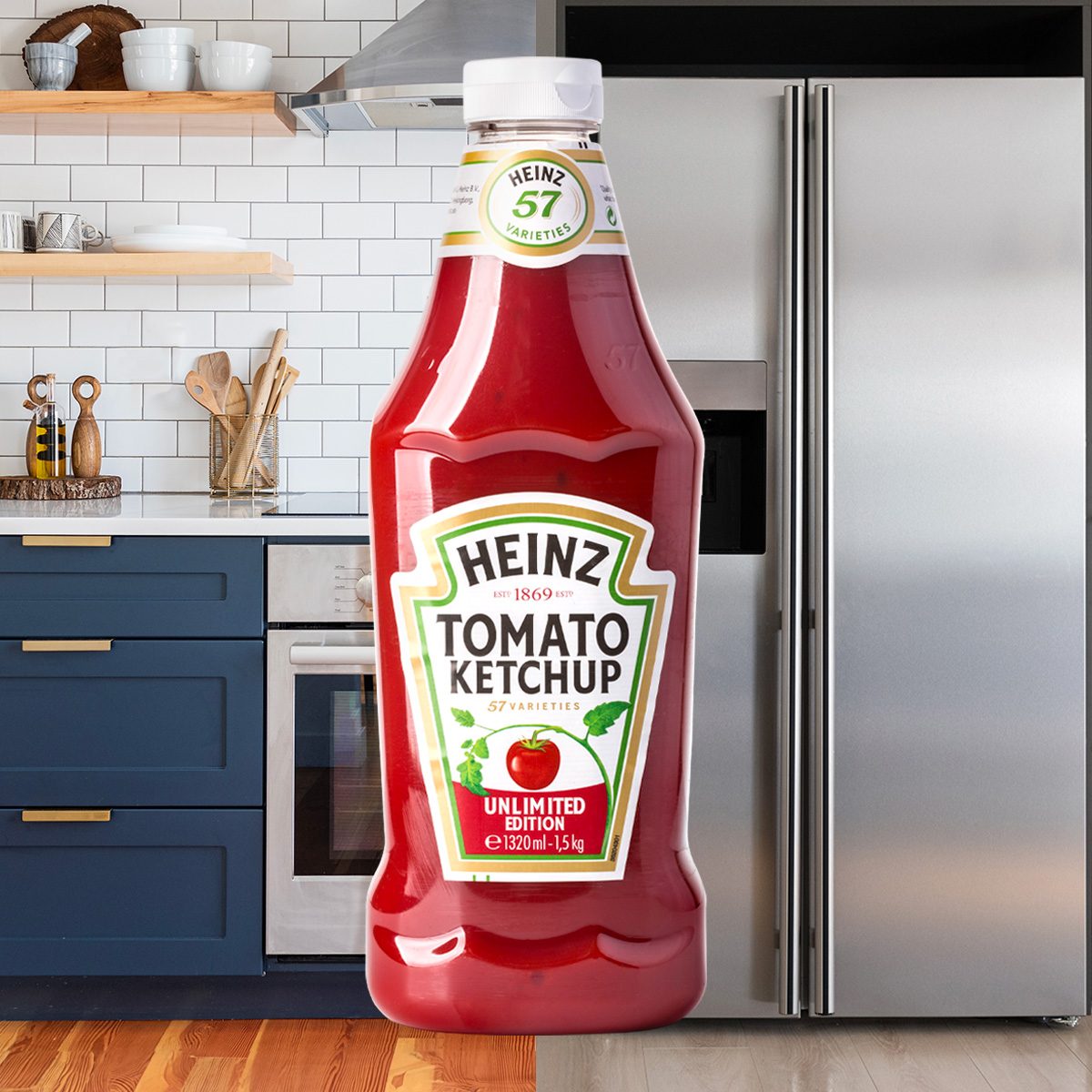There is a clear winner in this debate

Here’s the Only Place You Should Store Your Ketchup

Everyone has preferences and pet peeves, some that they prefer to keep to themselves and others that they will shout from the rooftops. And when it comes to food-related preferences, doesn’t it always seem like everyone is getting out their megaphones?
Take ketchup, for instance, our favorite addition to burgers, fries and other barbecue and ballpark staples. Some people prefer to keep it at room temperature in their cupboard or pantry, citing the weirdness of putting a cold condiment on a hot food. Others would never dream of storing it anywhere but the fridge because that’s just what you do!
Is one group right and the other wrong, or does the answer lie more in the gray (er, red?) area in between? Here and now, we’re settling the great ketchup debate.
Get Reader’s Digest’s Read Up newsletter for more food news, humor, cleaning, travel, tech and fun facts all week long.
What’s the right way to store ketchup?

So is there really a right way to store ketchup? Before we answer, we have to dig a little deeper. You see, it depends on the state the ketchup bottle is in—namely, if you have opened it yet or not.
Unopened bottle
Ketchup is shelf-stable, so an unopened bottle can be stored at room temperature in the pantry. If you check the expiration date printed on the bottle, it may be up to a year in the future, which means it’s fine to keep a bottle in your cupboard until then or even beyond—many people report ketchup still being good for up to a year past this date.
The key here, though, is unopened: If the bottle is broken or a hole is pierced in the side, these rules no longer apply.
Opened bottle
This is where it starts to get contentious. Should you keep an open bottle of ketchup in the fridge or in the pantry? In 2023, Heinz U.K. conducted a poll asking people where they kept their ketchup. Of the 13,000-plus respondents, 63% said they stored it in the refrigerator, while 37% said the cupboard. Heinz itself chimed in afterward, saying that they do recommend refrigerating their ketchup after opening.
So which is right? “If it takes you months to go through a bottle of ketchup, keep it in the fridge,” says Tania Elliott, MD, an internal medicine physician, allergist and immunologist who helps people avoid allergens, viruses and bacteria in their daily lives. “If it takes you a few days, you can leave it out.”
What happens if you don’t refrigerate ketchup?
Dr. Elliott recommends refrigerating ketchup for the same reasons we refrigerate eggs, meat and other fresh foods: to slow the growth of harmful bacteria like salmonella and E. coli that could cause food poisoning and potentially make us sick. Bacteria grow most rapidly at temperatures between 40 degrees and 140 degrees Fahrenheit, per the USDA, which is why we set our refrigerators below 40 degrees.
That said, the vinegar and tomatoes in ketchup make it naturally acidic, which is why it’s shelf-stable, while the absence of protein makes it an unfavorable environment for bacteria. Plus, since ketchup is typically in a closed container before being squeezed or poured out (as opposed to, say, a jar of salsa that you may be dipping chips or veggies into), an extra step would likely need to take place before we need to worry about bacteria growth.
“You can get sick from ketchup that’s not in the fridge only if it has been contaminated and yeast, bacteria or mold grow in it,” Dr. Elliott explains. “This is more likely to happen if you are sticking a dirty utensil into the ketchup, introducing bacteria, or it has been exposed to extreme heat or has been opened and sitting there for months.”
So as long as you’re going through ketchup relatively quickly and not sticking knives or fingers into the bottle, there’s not much harm in storing it in the pantry. That said, it could affect the taste. The USDA’s FoodKeeper App also gives the A-OK for you to store ketchup in the pantry at room temperature after opening, with that caveat: “Quality, not safety, is the reason the labels on these products suggest that they be refrigerated after opening.” But if you can tell the difference and want to err on the side of caution, it’s probably best to keep it in the fridge.
Hold on—isn’t ketchup left out at restaurants?
Yes, but that’s because they use so much of it. “Restaurants go through ketchup very quickly, like a bottle every few days,” says Dr. Elliott. The bigger thing to think about at restaurants, she notes, is whether bacteria has been introduced.
“I’d avoid any ketchup that has been sitting out at the restaurant table when you get there,” Dr. Elliott suggests. “You have no idea what the previous customer may have done to it, like licked it, used their knife with food on it to get more ketchup out, or mixed it with other condiments. That is a recipe for bacteria and contamination.”
Better to ask your server for a new bottle or ask for a side of ketchup instead.
How long does ketchup last?
According to the FoodKeeper App, an unopened bottle of ketchup stored in the pantry will keep for one year after purchase, while an open bottle will be fine for six months in the fridge.
That said, if those dates pass and the ketchup still seems OK, it probably is. But if it has changed color, doesn’t smell right or looks like it might be moldy, toss it right away.
What should you do with ketchup that’s been outside for a barbecue?
If you set out a bottle of ketchup alongside the mustard, relish, burgers and hot dogs at your next barbecue, you should be able to pop it in the fridge at the end of your get-together without worry. Though, of course, there are a few exceptions to this rule.
Dr. Elliott says that if it’s exposed to extreme heat—say, in direct sun on a sweltering day for hours—you may want to toss it just to be safe. And if you are sharing ketchup at a barbecue, make sure it’s a bottle with a squeeze top and that no one takes the cover off. “There’s a contamination risk if people are putting knives in there to get ketchup out,” Dr. Elliott notes. Otherwise, it’s A-OK to bring it back inside and use it again the next day.
RELATED:
- Don’t Make This Mistake at Your Next BBQ—It Could Ruin Your Party
- Here’s Why Grocery Stores Spray Produce with Water (And No, It’s Not Always for Freshness)
- The Newest Costco Dessert Is a Must for Your Next Barbecue
About the expert
|
Why trust us
At Reader’s Digest, we’re committed to producing high-quality content by writers with expertise and experience in their field in consultation with relevant, qualified experts. We rely on reputable primary sources, including government and professional organizations and academic institutions as well as our writers’ personal experiences where appropriate. We verify all facts and data, back them with credible sourcing and revisit them over time to ensure they remain accurate and up to date. Read more about our team, our contributors and our editorial policies.
Sources:
- Heinz U.K.: “Where do you keep yours?”
- Daily Mail: “Heinz settles age-old debate about where ketchup should be stored – but not everyone is convinced”
- Tania Elliott, MD, physician, allergist, clinical instructor at NYU Langone Health and author of Dr. Tania’s Healthy Home Guide; email interview, July 8, 2025
- USDA: “Why is a refrigerator important for keeping food safe?”
- FoodSafety.gov: “FoodKeeper App: Ketchup cocktail or chili sauce”























